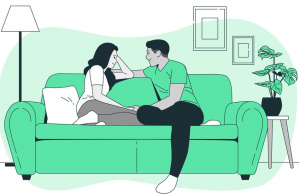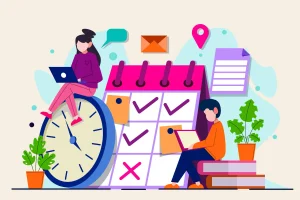Marriage Counseling: Can It Save Your Relationship?
By Prapoorna M
Last Updated: June 10, 2024
Are you finding it challenging to communicate effectively with your partner? Or perhaps you feel a growing distance in your relationship and are unsure how to bridge the gap. If these scenarios sound familiar, you’re not alone, and marriage counseling might be the solution you’re looking for.
Marriage counseling, also known as couples therapy or relationship counseling, plays a crucial role in helping partners navigate through tough times and strengthen their bond. It’s not just about addressing conflicts; it’s about fostering a deeper understanding and connection between partners. Engaging in marriage counseling can be a transformative experience, promoting both relationship and individual growth.
Understanding Marriage Counseling
What is Marriage Counseling?
Marriage counseling, often referred to as couples counseling, relationship counseling, or couples therapy, is a type of therapy that supports people in intimate relationships. The primary goal is to help partners gain a deeper understanding of each other and resolve conflicts that might be causing distress in their relationship.
Definition and Purpose:
Marriage counseling involves meeting with a trained therapist to discuss and address issues in your relationship. The therapist acts as a mediator, helping both partners communicate more effectively, understand each other’s perspectives, and develop strategies to overcome challenges. The ultimate aim is to improve the relationship’s overall health and to foster a stronger emotional connection between partners.
Common Terms:
- Couples Counseling: Focuses on improving the relationship dynamics between partners.
- Relationship Counseling: Similar to couples counseling, it can also include non-romantic relationships.
- Couples Therapy: Another term for couples counseling, emphasizing therapeutic techniques to resolve relationship issues.
Finding the Right Marriage Counselor
Choosing the right marriage counselor is crucial for the success of your therapy. Here are some key qualities to look for in a good marriage counselor to ensure that both you and your partner feel comfortable and supported throughout the process.
Key Qualities of a Good Marriage Counselor
- Training and Experience: A good marriage counselor should have the proper training and experience to handle the specific issues you and your partner are facing. Look for counselors who are licensed marriage and family therapists (LMFT), as they have specialized training in couples therapy. Additionally, check if they have experience dealing with issues similar to yours, whether it’s communication problems, infidelity, or other relationship challenges.
- Compatibility with Both Partners: It’s essential that both partners feel at ease with the counselor. The counselor should be someone both of you can trust and feel comfortable opening up to. During the initial sessions, evaluate whether the counselor is a good fit for both of you. They should be someone who listens actively and respects each partner’s perspective.
- Compassion and Neutrality: A good marriage counselor shows compassion and remains neutral. They should not take sides but rather help both partners understand each other’s viewpoints. The counselor’s role is to facilitate constructive communication and help both partners work toward mutual understanding and resolution.
- Accessibility and Affordability: Consider the counselor’s availability and whether they are easily accessible. It’s important to choose a counselor whose schedule aligns with yours and who is located conveniently. Additionally, check their fees and whether they accept your insurance to ensure that the sessions are affordable in the long term.
Different Approaches to Marriage Counseling
Marriage counseling is not a one-size-fits-all solution. There are several therapeutic approaches, each with unique methods and benefits. Understanding these can help you and your partner choose the approach that best fits your relationship’s needs.
Popular Therapeutic Approaches
- Imago Relationship Therapy: Imago relationship therapy focuses on transforming conflict into healing and growth. It helps partners understand each other’s childhood experiences and how these influence their current behavior and perceptions. By fostering empathy and understanding, this approach aims to restore communication and connection.
- Emotionally Focused Therapy: Emotionally focused therapy (EFT) aims to create secure emotional bonds between partners. It helps couples understand and restructure their emotional responses, leading to improved attachment and emotional connection. EFT is particularly effective in addressing issues of trust and intimacy.
- The Gottman Method: The Gottman Method is based on extensive research and emphasizes building strong marital foundations through trust, commitment, and effective communication. This method includes exercises to increase closeness and respect while managing conflict constructively.
- Positive Psychology Positive psychology in marriage counseling focuses on enhancing positive aspects of the relationship, such as strengths and positive emotions. It encourages couples to build on their positive experiences and qualities, promoting a more optimistic and resilient relationship.
- Narrative Therapy: Narrative therapy helps couples reframe and rewrite the stories they tell about their relationship. By exploring different perspectives on past issues, couples can gain new insights and identify changes they need to make. This approach fosters understanding and cooperation.
Comparison of Therapeutic Approaches
| Approach | Key Focus | Ideal For |
|---|---|---|
| Imago Relationship Therapy | This approach focuses on understanding how past influences, especially childhood experiences, affect current relationship dynamics. By exploring these past influences, partners can develop empathy and better communication. | Couples with childhood-related issues that impact their relationship dynamics. |
| Emotionally Focused Therapy | Emotionally Focused Therapy (EFT) aims to create and strengthen emotional bonds between partners. It helps couples recognize and change negative interaction patterns and fosters emotional security. | Couples need to improve their emotional connection and attachment. |
| The Gottman Method | The Gottman Method is based on research and emphasizes building trust, commitment, and effective communication. It includes exercises to increase closeness and respect while managing conflict constructively. | Couples looking to build strong, lasting foundations in their relationship. |
| Positive Psychology | This approach focuses on enhancing positive traits and experiences within the relationship. It encourages couples to build on their strengths and positive emotions, promoting a more optimistic and resilient partnership. | Couples wanting to focus on and enhance their relationship strengths. |
| Narrative Therapy | Narrative Therapy involves helping couples reframe and rewrite their stories about their relationship. Couples can gain new insights and identify necessary changes by exploring different perspectives. | Couples want to focus on and enhance their relationship strengths. |
Choosing the Right Approach for You
Selecting the right therapeutic approach depends on your specific relationship needs. Here are some factors to consider:
- Nature of Issues Identify the primary challenges in your relationship. For example, if emotional disconnection is a major issue, emotionally focused therapy might be beneficial.
- Personal Preferences Consider your comfort with different therapeutic styles. Some people may prefer a structured approach like the Gottman Method, while others might resonate more with the empathy-driven Imago therapy.
- Counselor’s Expertise: Ensure the marriage counselor you choose is trained and experienced in the specific approach that interests you. Their expertise will significantly influence the effectiveness of the therapy.
- Goals for Therapy: Discuss with your partner what you hope to achieve through counseling. Aligning your goals with the therapeutic approach can enhance the therapy’s success.
What to Expect During Sessions
Understanding what to expect during marriage counseling sessions can help alleviate any anxiety and prepare you for a productive experience. Here, we’ll outline the typical structure of therapy sessions and discuss common challenges you might face, along with strategies to overcome them.
Structure of Therapy Sessions
- Typical Session Frequency and Duration: Marriage counseling sessions are usually held once a week, although the frequency can vary depending on your specific needs and goals. Each session typically lasts about 50 minutes to an hour. Some couples may require more frequent sessions initially, which can be spaced out as progress is made.
- Individual vs. Joint Sessions: While the majority of marriage counseling sessions involve both partners, there may be times when individual sessions are beneficial. Individual sessions allow each partner to explore personal issues in a safe space, which can then be addressed in joint sessions. Your counselor will determine the best mix of individual and joint sessions based on your relationship dynamics and therapeutic goals.
Common Challenges and How to Overcome Them
Handling Conflict During Sessions Conflict is a natural part of any relationship, and it often surfaces during counseling. It’s important to remember that the counselor’s office is a safe space to express your feelings. Here are some tips to handle conflict constructively during sessions:
- Stay Calm: Take deep breaths and try to remain composed.
- Listen Actively: Focus on understanding your partner’s perspective without interrupting.
- Use “I” Statements: Express your feelings using “I feel” rather than “You always” to avoid blame.
Maintaining Motivation and Dedication Maintaining motivation throughout the counseling process can be challenging, especially when progress seems slow. Here are some ways to stay committed:
- Set Clear Goals: Having specific, achievable goals can keep you focused and motivated.
- Celebrate Small Wins: Acknowledge and celebrate small improvements in your relationship.
- Stay Patient: Understand that change takes time, and be patient with yourself and your partner.
- Practice at Home: Apply the skills and strategies you learn in counseling in your daily interactions.
When to Seek Marriage Counseling
Deciding when to seek marriage counseling can be challenging, but recognizing the signs early can make a significant difference. Here, we’ll discuss common indicators that you might need marriage counseling and the benefits of seeking help proactively, including the advantages of premarital counseling.
Common Signs You Need Marriage Counseling
Relationships naturally face ups and downs, but certain issues can indicate the need for professional help:
- Communication Issues If you and your partner find it difficult to communicate without misunderstandings or arguments, it might be time to seek counseling. Effective communication is the cornerstone of a healthy relationship, and a counselor can help you develop better communication skills.
- Power Struggles Constant power struggles and a lack of balance in decision-making can create tension and resentment. Counseling can help you understand and address these dynamics, fostering a more equitable partnership.
- Infidelity Infidelity can severely damage trust and intimacy. If you or your partner have experienced infidelity, counseling can provide a safe space to address the betrayal, rebuild trust, and heal together.
- Emotional Distance Feeling emotionally disconnected from your partner can be a sign that your relationship needs attention. Counseling can help you reconnect and strengthen your emotional bond.
- Frequent Arguments While disagreements are normal, frequent and intense arguments that lead to unresolved issues can harm your relationship. A counselor can help you navigate conflicts more constructively.
- Loss of Intimacy A decline in physical or emotional intimacy can be a red flag. Counseling can help you explore the underlying reasons and work towards restoring intimacy.
Proactive Counseling
Seeking help before issues escalate into crises can prevent further damage and foster a healthier relationship. Proactive counseling involves addressing minor issues early on, which can prevent them from becoming major problems.
Benefits of Premarital Counseling Premarital counseling is an excellent way for engaged couples to build a strong foundation before marriage. It helps couples:
- Discuss and align their expectations.
- Explore potential areas of conflict.
- Develop effective communication and problem-solving skills.
- Strengthen their emotional connection.
Signs You Might Need Marriage Counseling
| Sign | Description |
|---|---|
| Communication Issues | Frequent misunderstandings or arguments that disrupt the flow of communication and create tension. |
| Power Struggles | Constant conflicts over decision-making lead to a struggle for control and balance in the relationship. |
| Infidelity | Trust issues arise from cheating or betrayal, which can severely damage the foundation of the relationship. |
| Emotional Distance | Feeling disconnected from your partner results in a lack of emotional intimacy and understanding. |
| Frequent Arguments | Regular, unresolved conflicts lead to a cycle of ongoing disagreements and tension. |
| Loss of Intimacy | A noticeable decline in physical or emotional closeness affects the overall connection between partners. |
Effectiveness of Marriage Counseling
Marriage counseling can significantly impact relationships, but its success depends on several factors. Understanding these can help you make the most out of your counseling experience.
Success Rates and Factors Influencing Outcomes
Research Findings on Marital Satisfaction Post-Therapy
Studies have shown that marriage counseling can lead to marked improvements in marital satisfaction. According to research, about 48% of couples experience improvement or full recovery in their relationship satisfaction within five years post-therapy. However, it’s important to note that the effectiveness of counseling can vary based on the couple’s unique circumstances and their commitment to the process.
Importance of Mutual Participation and Open-Mindedness
The success of marriage counseling largely depends on the mutual participation and open-mindedness of both partners. When both individuals are willing to work on their relationship and apply the strategies learned in therapy, they are more likely to see positive changes. On the other hand, if one partner is reluctant or expects the other to change without making personal efforts, the effectiveness of counseling can be significantly reduced.
How to Make the Most Out of Marriage Counseling
Tips for Engaging Effectively
- Being Open and Honest: Being transparent and honest during counseling sessions is crucial. Share your thoughts, feelings, and concerns openly with your partner and the counselor. This honesty lays the foundation for genuine understanding and effective problem-solving.
- Practicing Learned Skills Outside of Sessions: The real progress often happens between sessions. It’s essential to practice the communication techniques and problem-solving skills you learn in counseling in your daily life. Consistent practice helps reinforce these new behaviors, leading to lasting changes in your relationship.
Long-Term Benefits
- Strengthened Emotional Bonds: One of the significant long-term benefits of marriage counseling is the strengthening of emotional bonds. As you work through issues and improve your communication, you develop a deeper connection with your partner. This emotional intimacy fosters a more resilient and fulfilling relationship.
- Improved Communication and Problem-Solving Skills: Marriage counseling equips you with better communication and problem-solving skills. These skills not only help resolve current issues but also prepare you to handle future challenges more effectively. Improved communication leads to fewer misunderstandings and more collaborative problem-solving, enhancing the overall health of your relationship.
Resources and Support
Engaging in marriage counseling is a significant step towards improving your relationship, but sometimes additional support can be beneficial. Here, we’ll explore other resources like individual therapy, online resources, and support groups that can complement your counseling journey.
Finding Additional Help
Individual Therapy: While marriage counseling focuses on the relationship, individual therapy can help address personal issues that may be impacting your partnership. Individual therapy provides a safe space to explore personal challenges, such as anxiety, depression, or past trauma, which can then be discussed in joint sessions. This dual approach ensures that both personal and relational issues are addressed comprehensively.
Online Resources and Support Groups: In addition to in-person therapy, various online resources and support groups can offer valuable support and information. These resources can provide tips, exercises, and community support, which can enhance your counseling experience.
- Support Groups: Joining a support group, either in-person or online, can connect you with others facing similar challenges. Sharing experiences and strategies can provide new insights and encouragement.
- Online Forums: Participating in online forums related to relationship counseling can be a great way to ask questions and receive advice from both professionals and peers.
Conclusion
Marriage counseling offers many benefits that can improve your relationship and personal well-being. It helps address communication problems, rebuild trust, and create a deeper emotional connection. By working through challenges together, you and your partner can grow stronger and more connected.
If you are facing conflicts, emotional distance, or other issues in your relationship, don’t wait for things to get worse. Taking the first step towards marriage counseling can prevent further problems and lead to a healthier, happier partnership. Seeking help shows strength and commitment to your relationship’s future. We encourage you to start today. For more resources and support, visit Wellness Hub, where you can find helpful information to guide you.
Frequently Asked Questions:
1. What is marriage counseling and how does it work?
Marriage counseling, also known as couples therapy, is a type of therapy that helps partners in a relationship address issues and improve their connection. A trained therapist guides couples through discussions and exercises to enhance communication and resolve conflicts.
2. How do I find the right marriage counselor?
Finding the right marriage counselor involves looking for someone with proper training and experience, ensuring compatibility with both partners and checking for compassion and neutrality. It’s also important to consider the counselor’s accessibility and affordability.
3. What are the different approaches to marriage counseling?
Popular approaches include Imago relationship therapy, Emotionally Focused Therapy (EFT), the Gottman Method, Positive Psychology, and Narrative Therapy. Each approach has unique methods and benefits, so choosing one depends on your specific relationship needs.
4. How often should we attend marriage counseling sessions?
Marriage counseling sessions are typically held once a week, with each session lasting about 50 minutes to an hour. The frequency can vary based on your specific needs and goals.
5. What should I expect during a marriage counseling session?
During a session, you can expect to discuss your issues openly with your partner and the counselor. Sessions usually involve both partners, but individual sessions may also be recommended. The counselor will guide you through exercises to improve communication and resolve conflicts.
6. What are common signs that we need marriage counseling?
Common signs include communication issues, power struggles, infidelity, emotional distance, frequent arguments, and a loss of intimacy. Seeking counseling early can prevent these issues from escalating.
7. Can marriage counseling really help improve our relationship?
Yes, research shows that marriage counseling can significantly improve relationship satisfaction. Success depends on mutual participation, open-mindedness, and a commitment to applying what you learn in therapy.
8. What additional resources are available for relationship support?
In addition to marriage counseling, individual therapy, online resources, and support groups can provide valuable support. Websites like Wellness Hub offer articles, guides, and tools to help you navigate your relationship journey.
9. When is the best time to seek marriage counseling?
The best time to seek marriage counseling is as soon as you notice persistent issues in your relationship. Early intervention can prevent problems from becoming more severe and difficult to resolve.
10. What are the benefits of premarital counseling?
Premarital counseling helps engaged couples build a strong foundation before marriage by discussing expectations and potential areas of conflict and developing effective communication skills. It prepares couples for a successful and fulfilling marriage.
About the Author:
Prapoorna Mangalampalli
M.Sc., M.A., (Dual Masters in Psychology & English) – Counselor (6+ years of experience)
Prapoorna, with dual Master’s degrees in Psychology and English and over 6 years of experience, elevates human experiences through insightful counseling. She excels in online, marital, relationship, child, family, and career counseling. At Wellness Hub, she thrives in a team environment, valuing innovation, compassion, and client success.
Connect with Prapoorna to find your voice and build a brighter future.
Book your Free Consultation Today
Parent/Caregiver Info:
Client’s Details:
* Error Message









